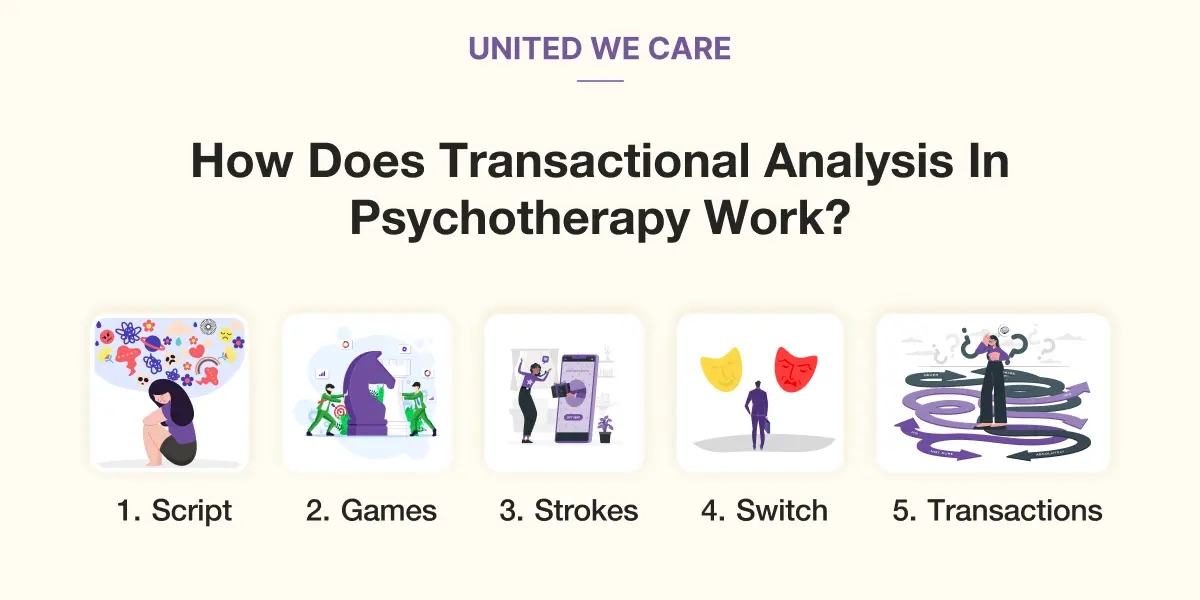Introduction
In everyday life, we go through various social transactions, some of them successful and others not so much. If you look closely at the bottom of any unsuccessful social transaction or conflict, there is a misunderstanding, i.e., when the sending and receiving ends do not complement each other. Through transactional analysis in psychotherapy, we can better understand the dynamics of human relationships and communication patterns.
Psychotherapist Eric Berne developed transactional analysis (TA) in the 1960s. Berne, who was greatly influenced by Sigmund Freud’s works, described three ‘ego states’ from which an individual operates in the world and communicates with other people. According to Berne, we form these states in our past, which are now stored in our memory and carried forward with us, and sometimes, we let them take control of us in a given situation or social transaction.
In this blog, we’ll discuss what TA is in psychotherapy, how it works, and its benefits in personal development.
What Is Psychotherapy?
Psychotherapy is a huge umbrella under which new advancements keep evolving as psychopathology evolves. But at its core, psychotherapy, or talk therapy, is about opening up consciously about your concerns.
What Is Transactional Analysis In Psychotherapy?
Transactional analysis in psychotherapy helps people promote personal change as well as growth by using conceptual tools. It helps people reach their full potential in different areas of life and develop constructive communication relationships. [1]
Ego State Theory By Eric Berne
The following ego states are formed based on our past experiences and memories, and they subconsciously guide the way we show up in social situations. [2]
- Parent: This state represents the people in your past who have influenced you negatively or positively (parents, relatives, or any other elder figure). When a person gets triggered to act like one of them, you can say that they are operating in the parent-ego state.
- Adult: It is when you’re yourself, here and now, completely rational and aware. Experiencing your importance, your impact on others, and taking into account what is going on around you.
- Child: This is a regressive state, where you go back to acting like a child and give in to your base instincts without any resistance, like a child with no control. This state contains all your memories and experiences of the past, and you are triggered to behave in the same way as you did then.
These ego states are present in each individual, and any healthy individual, as well as a patient, can move from one ego state to another. The ego states that cathected in any way, at any point, has the executive power, i.e., it’s in control. A healthy individual has less or no problem passing this executive power to the most apt ego state according to the situation’s demands, but an unhealthy individual does not. Hence, TA helps an individual recognize this unhealthy pattern of communication with the world, and combined with other tools, psychotherapy paves the way toward a healthier way to communicate.
Transactional analysis assists individuals in regaining control of their adult state by releasing them from fixation, allowing them to move through their ego states as per social demands.
How Does Transactional Analysis In Psychotherapy Work?
Before we delve into how TA works with psychotherapy, let’s take note of some important terms related to TA: [3]

- Script: It is a story that people form and internalize about themselves. It can be in the form of repetitive negative behavior, thoughts, or emotions that stem from childhood decisions or lessons.
- Games: The script is used to participate in a social game where things are done for either external validation or manipulation.
- Strokes: Receiving instant gratification by playing out the internalized scripts in a social setting.
- Switch: When the internalized script falls off, and the person has to switch between ego states to mask their vulnerability.
- Transactions: When people communicate, their ego states interact to form transactions. Transactions tend to be healthier when the ego-states interact healthily. However, ego-states can sometimes damage each other, resulting in a distorted view of the world.
Types Of Transactions
- Complementary Transaction: When the communication between the sender and the receiver compliments each other. For example, when a wife is upset about losing something, the husband comforts her. Here, the wife is in the child state, so the husband shows support and assumes the parent state, both of which complement each other and create a successful social transaction.
- Crossed Transaction: When the communication between the sender and the receiver is crossed. For instance, in the above example, if the husband also moved into his child state, he would respond to his wife insensitively, making it all about himself, which would cause them both to fight.
- Ulterior transaction: when the communication between the sender and the receiver is in the same state but has an ulterior motive. For example, if a salesperson can sell his product by saying it’s not for amateurs, the adult state will understand this message, but the child state will pick up this bait and want to buy the product for the sake of it.
The goal of TA therapy is to solidify the individual’s adult state so that they can have autonomy over their actions by determining what causes the individual to enter the parent or child’s ego state. This is achieved through the application of conceptual tools from various schools of thought, such as psychodynamics, rational therapies, and CBT. The therapist plays a very active and directive role in transactional analysis; They help individuals become aware of the thoughts, emotions, and behaviors that are impeding their development. This entire process is called script analysis, i.e., exploring and analyzing the script developed in childhood. [4]
Benefits Of Transactional Analysis In Psychotherapy
TA is primarily useful in improving self-awareness, communication skills, and interpersonal relationships. Therapists use it to:
- Gain a more solution-focused approach in short-term therapy.
- Gain insight into an individual’s unconscious world and how they form relationships with themselves and others on a long-term basis.
- Decrease conflicts and improves life satisfaction, self-esteem, intimacy, and bonding in romantic relationships.
- Help individuals and couples and in family counseling.
- Teach parents a healthier authoritative style instead of authoritarian and pessimistic styles.
Conclusion
In psychotherapy, transactional analysis provides valuable insights into communication dynamics and promotes personal growth. Its use in both short-term and long-term therapy promotes healthier relationships, increased self-awareness, and increased life satisfaction. If you’re looking to consult with a therapist trained in TA, United We Care offers a wide range of therapists trained in different therapy approaches. Based on your needs and requirements, our therapists at United We Care will recommend an approach that is most effective for you.
References
[1] E. Berne, Transactional Analysis in Psychotherapy: A Systematic Individual and Social Psychiatry. [Online]. Available: https://books.google.co.in/books/about/Transactional_Analysis_in_Psychotherapy.html?id=hYjjDAAAQBAJ. Accessed: Dec. 25, 2023.
[2] “Ego States in Psychotherapy,” American Journal of Psychotherapy, vol. 11, no. 2, pp. 293–309, 1957. [Online]. Available: https://doi.org/10.1176/appi.psychotherapy.1957.11.2.293. Accessed: Dec. 25, 2023.
[3] International Transactional Analysis Association, “Key Concepts in Transactional Analysis.” [Online]. Available: https://itaaworld.org/key-concepts-transactional-analysis. Accessed: Dec. 25, 2023.
[4] J. M. Whiteley and J. Z. Cohen, Transactional Analysis: A Demonstration of Individual Therapy — Elaine. American Personnel and Guidance Association. [Online]. Available: https://archive.org/details/transactionalanalysisademonstrationofindividualtherapyelaine. Accessed: Dec. 25, 2023.









